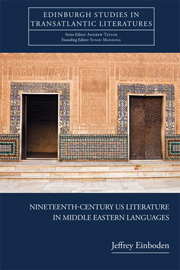Book contents
- Frontmatter
- Contents
- Acknowledgments
- Dedication
- Introduction
- Part I Scriptural Circulations
- 1 Judaic Maccabæus: Longfellow and Joseph Massel
- 2 Mahomet or Muḥammad? Irving and 'Alī Ḥusnī al-Kharbūṭlī
- Part II Orienting the American Romance
- Part III ‘I too am untranslatable’: Middle Eastern Leaves
- Notes
- Bibliography
- Index
2 - Mahomet or Muḥammad? Irving and 'Alī Ḥusnī al-Kharbūṭlī
from Part I - Scriptural Circulations
Published online by Cambridge University Press: 05 October 2013
- Frontmatter
- Contents
- Acknowledgments
- Dedication
- Introduction
- Part I Scriptural Circulations
- 1 Judaic Maccabæus: Longfellow and Joseph Massel
- 2 Mahomet or Muḥammad? Irving and 'Alī Ḥusnī al-Kharbūṭlī
- Part II Orienting the American Romance
- Part III ‘I too am untranslatable’: Middle Eastern Leaves
- Notes
- Bibliography
- Index
Summary
Delivered to the Massachusetts Historical Society on 15 December 1859, Longfellow's ‘Address on the Death of Washington Irving’ concludes with a series of vigorous ‘resolutions’. Recommending first to the Society that they ‘rejoice in the completeness of his life and labors’, Longfellow's second resolution broadens scope, turning from Irving's ‘completed’ life to his enduring legacy:
Resolved, That we feel a just pride in his renown as an author, not forgetting that, to his other claims upon our gratitude, he adds also that of having been the first to win for our country an honorable name and position in the History of Letters.
A canonising act rather than personal memorial, this resolution emphasises, above all, Irving's precedence – he is ‘first […] for our country’, ushering America into the ‘History of Letters’. Irving's national primacy is anticipated, moreover, by the childhood experiences of Longfellow himself; opening his ‘Address’ not with Irving's public significance, but his private influence, Longfellow recalls:
Every reader has his first book. I mean to say, one book among all others, which in early youth first fascinates his imagination, and at once excites and satisfies the desires of his mind. To me, the first book was the Sketch Book of Washington Irving.
Pioneering the literary biography of America, Irving also pioneers Longfellow's own, shaping the ‘early youth’ of the corporate ‘country’, as well as this individual ‘reader’.
- Type
- Chapter
- Information
- Publisher: Edinburgh University PressPrint publication year: 2013

